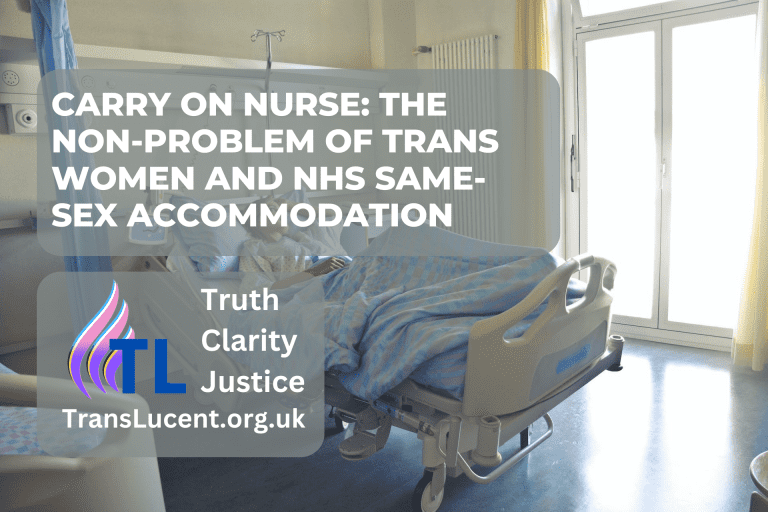The Non-problem of Trans Women and NHS Same-Sex Accommodation
An assault on NHS values
In his October 2023 Conservative Party conference speech, the then Secretary for State for Health and Social Care (DHSC), Steve Barclay, announced that the Government would
“… change the NHS constitution … to make sure we respect the privacy, dignity and safety of all patients, recognise the importance of different biological needs and protect the rights of women.”
This commitment was widely reported, presumably on the basis of briefings, as paving the way for a ban on trans women being treated in ‘female-only’ wards.
The NHS Constitution for England is the document that sets out the fundamental values of our NHS: that compassion is central to NHS care; that respect and dignity are to be afforded to all its users; and the commitment that
“…nobody is excluded, discriminated against or left behind”.
One wonders which of these values would be served by forcing a trans woman with a hip fracture to be cared for in an orthopaedic ward that is otherwise reserved for men? Alternatively, which of these values might be sacrificed to make such a disgraceful manoeuvre possible?
A surprising priority
At a time when the NHS seems to be in crisis in terms of waiting lists, cancer care, delays in A&E – not to mention the strikes – changes to the NHS Constitution are the sort of intervention one might expect to be aimed at solving truly significant, indeed fundamental, problems.
But as TransLucent has previously reported, surveys in 2021 and 2022 of a sample of NHS trusts showed that they had not received any complaints about trans women being cared for on women’s wards.
Mindful of the cost to the NHS of responding to Freedom of Information requests, we would have been content to let the matter rest with this clear demonstration of a non-problem. However, the Government seems intent on making it a battle in their culture war – and so, to be prepared for DHSC’s promised assault on NHS values, we decided we needed to get an up to date and comprehensive picture.
A problem that just won’t appear
This time we polled all 180 acute and mental health trusts in England responsible for the inpatient care of adult men and women – asking how many complaints they had received in the 12 months to September 2023 regarding the presence of trans women on women’s wards. Full details of Methods and all the responses we’ve received are published here.
We included mental health trusts in this survey as they have an additional and important duty to provide women-only day rooms for their inpatients – and so we also asked this subgroup of 50 trusts how many complaints they had received about trans women’s use of these day rooms.
Well, the numbers are in: nearly 90% of trusts have responded substantively at the time of writing.
It turns out that during the year in question, throughout the whole of the relevant part of the NHS, just one (1) complaint was received on this topic (by an acute trust).
To put this startling number in context, over the same period those acute and mental health trusts will have cared for around 6.75 million adult women inpatients.1 And it is not that patients don’t complain about their hospital care when they experience a problem they consider significant. In the year to April 2023, the NHS (excluding GPs and dentists) received nearly 200,000 written complaints.2
Setting that global perspective aside, TransLucent recognises that all complaints are important to the individuals who make them. We do not know the details of the solitary complaint about trans women in single sex accommodation that was made to the NHS that year – but the trust concerned has assured us in a further FOI response that none of the matters referred to in the complaint required handling as a ‘serious incident’. This is a formal category used by the NHS which would generally cover matters, including those raised in complaints, where an individual was subject to serious harm, or actual or alleged abuse, sexual abuse, or physical or psychological ill-treatment.
Carry on nurse
This is a topic characterised by continuity: our repeated surveys have highlighted the same non-problem over and over again (despite the efforts of those attempting to weaponise the topic); trans women have always been treated on women’s wards where they are available; the NHS has long had in place sensible, inclusive and compassionate guidance on the topic.
That guidance pretty much reduces to “Trans people should be accommodated according to their presentation: the way they dress, and the name and pronouns they currently use”. This is coupled with a recognition that the privacy of patients in a state of undress can be generally assured using the cutting-edge clinical technology referred to in the document as “curtains”.
TransLucent very much hopes that NHS nurses, doctors and managers will be allowed to carry on doing what they are clearly succeeding at currently – balancing the sometimes competing needs of millions of men and women with compassion and expertise. It is inclusion in action.
At the same time, we do wish that Ministers would stop behaving like characters in a Carry On film, exhibiting instincts and values (along with an excessive interest in the contents of other people’s underwear) that should have been abandoned long ago. Instead of attempting to fix the NHS Constitution to allow the exclusion of a small minority from the compassion that is due to everyone, perhaps they could turn their attention to some of the causes of the estimated 99.999% of complaints received by NHS hospitals that are not about trans women.
NOTE FOR EDITORS: In total, TransLucent has made four investigations by way of 282 FOIRs, asking NHS Foundation Trusts (or equivalent) how many complaints they have received about trans women patients in female hospital wards. In total, the period we have covered is three years and three months. All the replies to our latest investigation can be found here in PDF format. We have only ever found one minor complaint.
Carry On Nurse: The Non-problem of Trans Women and NHS Same-Sex Accommodation – References
1 ‘Hospital Admitted Patient Care Activity, 2022-23’, NHS Digital <https://digital.nhs.uk/data-and-information/publications/statistical/hospital-admitted-patient-care-activity/2022-23> [accessed 30 December 2023].
2 ‘Data on Written Complaints in the NHS, 2022-23’, NHS Digital <https://digital.nhs.uk/data-and-information/publications/statistical/data-on-written-complaints-in-the-nhs/2022-23> [accessed 30 December 2023].











 To provide the best experiences, we use technologies like cookies to store and/or access device information. Consenting to these technologies will allow us to process data such as browsing behaviour or unique IDs on this site. Not consenting or withdrawing consent, may adversely affect certain features and functions.
To provide the best experiences, we use technologies like cookies to store and/or access device information. Consenting to these technologies will allow us to process data such as browsing behaviour or unique IDs on this site. Not consenting or withdrawing consent, may adversely affect certain features and functions.